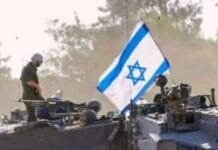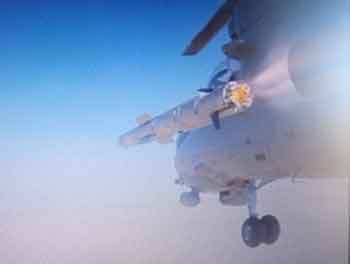The killing of Hassan Nasrallah, the leader of the Iran-backed militant group Hezbollah, in an Israeli airstrike on Friday in Beirut, has sparked a series of protests in Kashmir. On Saturday, thousands of demonstrators, including women and children, took to the streets to voice their outrage, condemning the death of the Hezbollah chief. Protesters gathered in Budgam, Srinagar, and several other areas in the region, holding up images of Nasrallah, waving Hezbollah flags, and chanting slogans against the Israeli strikes.
The protesters are mourning the loss of Hassan Nasrallah, a figure widely seen as a resistance symbol by many in the region. The leader’s death has triggered a strong emotional response, not only in Lebanon but also in Jammu and Kashmir, where sentiments of solidarity with Palestine and Lebanon have historically resonated. The Israeli airstrike, which targeted Hezbollah’s headquarters in Beirut, was confirmed by both Israeli and Hezbollah officials, marking a critical blow to the militant group engaged in long-standing conflict with Israel.
Protests in Kashmir Over the Death of Hezbollah Leader Hassan Nasrallah, Watch the Viral Video
Hezbollah’s Hassan Nasrallah: A Figure of Influence
Hassan Nasrallah, 64, has been the face of Hezbollah for over three decades. Under his leadership, Hezbollah expanded its military and political influence in Lebanon and beyond. Nasrallah has been a controversial figure, seen as a symbol of resistance by his supporters and as the leader of a terrorist organization by countries like the United States, Israel, and many in the international community. His fiery rhetoric against Israel and Western powers made him a significant figure in the Middle East.
The news of his death in the airstrike reverberated across several countries, with his supporters mourning his passing while others celebrated it as a victory against terrorism. In Jammu and Kashmir, the death of Nasrallah hit particularly hard, as the region has long harbored strong sympathies for the Palestinian and Lebanese cause, especially in light of the recent escalation in the conflict between Hezbollah and Israel.
Protests in Kashmir: Uniting in Condemnation
The streets of Budgam were filled with protesters carrying posters of Hassan Nasrallah, chanting anti-Israel slogans, and calling for justice. A significant number of women and children were seen participating in the protests, underscoring the depth of emotional connection many in the region feel toward the Palestinian and Lebanese struggles. Similar scenes were witnessed in Srinagar, where large crowds gathered in the old city, waving Hezbollah flags and voicing their anger at the Israeli strikes.
The protests were not isolated to these areas alone. Several towns across Kashmir witnessed demonstrations, as people expressed their discontent with what they view as an act of aggression by Israel. Hezbollah’s symbolism and the perception of Nasrallah as a resistance leader against Israeli occupation and Western influence have garnered widespread support in the region.
Former Chief Minister Mehbooba Mufti’s Reaction
In a move that further amplified the region’s sentiment, former Jammu and Kashmir Chief Minister Mehbooba Mufti announced that her People’s Democratic Party (PDP) would cancel its campaign for the upcoming assembly elections as a mark of respect for Nasrallah. In a statement, Mufti declared, “We stand with the people of Lebanon and Gaza in this hour of grief and exemplary resistance.” She also emphasized her party’s solidarity with the “martyrs of Lebanon and Gaza, especially Hassan Nasrullah,” calling for the international community to recognize the plight of Palestinians and the Lebanese people under Israeli attacks.
Mufti’s stance highlights the broader political and emotional connections between the Kashmir conflict and the Palestinian cause. This shared sense of resistance against what is perceived as foreign occupation has created a strong sense of unity between the people of Jammu and Kashmir and Lebanon’s Hezbollah supporters.
The Israeli Airstrikes and Their Aftermath
The Israeli strikes on Hezbollah positions in Beirut have not only claimed the life of Hassan Nasrallah but also several other prominent figures. Among the casualties were Nasrallah’s daughter, Zainab Nasrallah, and Ali Karaki, Hezbollah’s Southern Front commander. Senior Iranian General Abbas Nilforoushan of the Revolutionary Guards was also killed in the strikes, a blow to Iran’s influence in the region and its military presence in Lebanon.
Israel’s offensive in Lebanon is part of a broader military campaign that has escalated significantly following Hezbollah’s increased attacks on Israeli targets. Hezbollah’s rocket fire into northern Israel prompted a retaliatory series of airstrikes from the Israeli Defense Forces (IDF), which have reportedly killed over 800 people in Lebanon and displaced thousands more. The strikes have caused widespread destruction, particularly in Beirut, with homes, businesses, and key infrastructure being reduced to rubble.
This latest wave of violence follows the October 7, 2023 attack by Hamas on Israeli territory, which drew in Hezbollah and further intensified the already volatile situation. Hezbollah, which has long been aligned with Hamas in their opposition to Israel, launched a series of rocket attacks into Israel, contributing to the surge in hostilities.
The Broader Implications of Nasrallah’s Death
Hassan Nasrallah’s death is not only a significant loss for Hezbollah but also has broader implications for the region’s geopolitical landscape. As the leader of a powerful militant organization with ties to Iran and Syria, Nasrallah’s influence extended far beyond Lebanon’s borders. His death raises questions about Hezbollah’s future leadership and the potential ramifications for Iran’s involvement in the region, especially as it seeks to maintain its influence through Hezbollah.
Moreover, with Hezbollah’s leader now gone, Israel’s military and political strategy in Lebanon may shift, potentially leading to a recalibration of their efforts to curtail Hezbollah’s power. However, the death of Nasrallah could also trigger further retaliation from Hezbollah, escalating the conflict even further and drawing in more regional actors.
A Call for International Attention
The protests in Kashmir, along with Mehbooba Mufti’s strong political statement, are a reflection of the broader regional dynamics that connect South Asia with the Middle East. The deep-rooted historical and political ties between the Palestinian cause and Kashmir’s own struggles have manifested themselves once again with the death of Hassan Nasrallah. For many in the region, his death represents a symbolic blow to the fight against occupation and imperialism, sentiments that continue to shape political discourse in Kashmir.
With the conflict between Israel and Hezbollah showing no signs of de-escalation, it is imperative for the international community to address the root causes of the violence. As the world watches the aftermath of Nasrallah’s death, the situation in Lebanon, Gaza, and Israel remains volatile, with the potential for further loss of life and devastation














